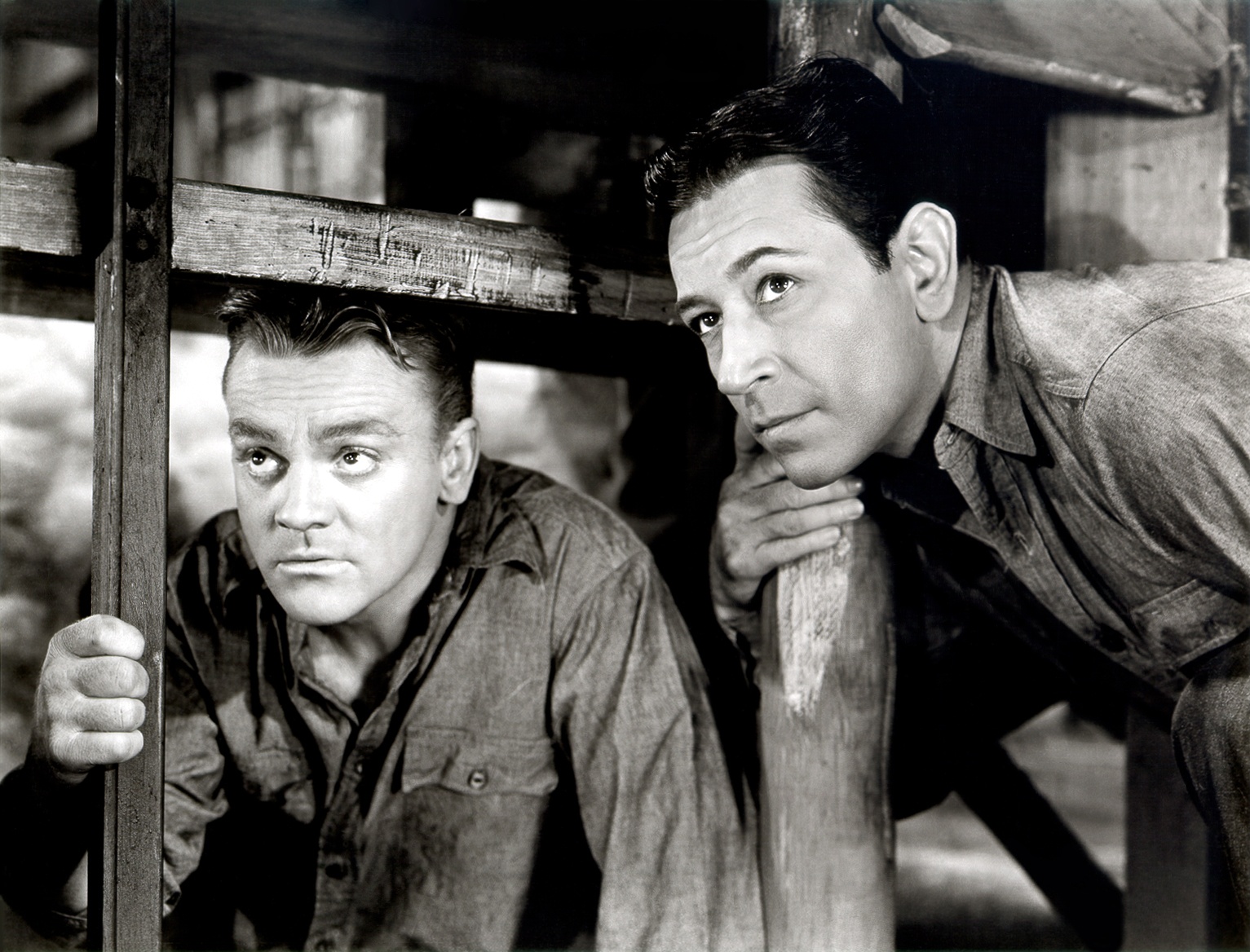So how tough are you, babe?
It would have been like Heat. Cagney was the violent, hot tempered irrepressible villain, all fire and thunder; George Raft was the cool, impeccably dressed, button downed gangster, all ice and stillness. The moment they end up next to each other on the bus in this movie, the only film in which they shared lead billing, you get to know that other generations had moments like Pacino and De Niro sitting down for coffee.
Unlike Heat, this film puts the two leads together repeatedly, sharing scenes together regularly, a clash of the titans. Like Heat, however, this film is a masterwork, though a masterpiece of economy, something Mann never heard of. Cagney is a crusading reporter; all too quickly, within just five minutes, he’s brushed against a crooked politician who’s running for governor. He’s ambushed and framed for manslaughter and sent to prison for twenty years; the political machine, the DA’s office, has its way. On the bus to prison, Cagney’s Frank Ross is seated next to George Raft’s clear headed Stacy, a bank robber and killer in for 199 years. 199 years this time. The argument starts immediately, but over the body of the film, the two will form a relationship that sustains them through their difficulties and leads them each to sacrifice for the other more than they think they can bear.
Cagney’s performance is a master class in acting; for once he underplays for almost the entire movie and there are moments that should be shown in every acting class: the look on Cagney’s face during that slow push in when he realizes he’s been framed, the scene where he is visited in prison by his fiancée and his mother, a scene where he barely moves his body, barely moves his face, but creates a tapestry of human suffering of incredible intensity. Later, on the walk back to the factory floor, he brushes at his face and the sadness and brokenness of that simple movement is something most actors couldn’t reach with all the histrionics in the world.
Raft is his equal, a deeply menacing character at times. A murder in a theater, Stacy throwing his knife again and again into bales of twine, practicing until he could split a hair at thirty paces; these moments burn into the brain. Most especially a late scene when Stacy is confronted by Ross’ fiancée is brilliantly acted. Raft makes his character’s slow journey to selflessness seem not maudlin and not clichéd, but simply an intelligent man slowly coming to realize that, for the first time in his life, he really owes someone else and what it means to accept that responsibility.
The film has all the clichés of the prison film; the rat, the sadistic screw, the sick prisoner, the one going stir crazy, the stint in the hole, the prison break, the riot, the parole board hearing. But the script weaves a story about two real men living through these circumstances and at times it subverts the clichés; Cagney’s anger during the parole board hearing is a physical thing, but when he finally snaps, it is to break down and sob like a child, a horrifying moment, one of two in the film when Cagney breaks down in a humiliating and powerful way. As bracing and shocking as these moments are today, I can’t imagine what the audience in 1939 would have thought to see Cagney in tears; it was this same year that Gable would resist unto blood to avoid having Rhett shed tears in Gone with the Wind. Gable would finally allow Rhett to shed a tear or two, but Cagney opens the floodgates.
And the climax is intense and violent, fast paced and high energy, so much so that the clichés don’t matter anymore. But mainly the film works because of those two beacons in the lead roles. Sometimes you get in your head from watching too many inferior older movies that the acting style really doesn’t translate, but when you see a truly fine film like this one, it’s obvious that Cagney and Raft were two actors who could survive in any filmmaking climate. Truly, the men deserve their legendary status; no one’s come along like them since, no one at all. The weight of veracity bears on every word they say; you simply believe it all. This film isn’t remembered as one of Cagney’s best, but I’m not sure why. His performance here is certainly right up there with his best and Raft is entirely forgotten all too often as his performance here shows.
Sometimes, the old films stand up and shout in your face; sometimes they survive with a manic intensity so fantastic you’d swear they’d been filmed yesterday. This is one of those films. Watching Cagney is always a pleasure. In a movie this good, it’s even more so. And look at him in that rain storm; luminous black and white: the two colors of this film’s images. Also the two extremes of two men, one innocent, one guilty, and the relationship they forge in spite of the difference.
4 ½ out of 5 stars.
